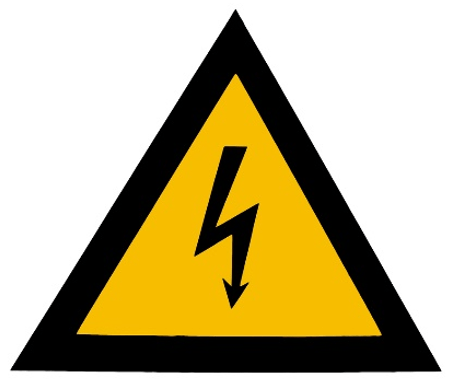Electrical Safety – General Guidelines
It is easy to underestimate the dangerous potential of electricity because its use is so common. However, electricity can cause burns, shocks, and electrocution. These hazards must be considered when working with equipment powered by electricity, working with electrical systems, or repairing broken energized equipment.
General safety guidelines:
- Always use caution when working with electricity.
- Post signs in all areas where electrical hazards are present.
- Make sure that connections are tight and that the grounding prong is in place.
- Consider implementing a lock out/tag out program to identify and eliminate electrical hazards while performing maintenance on machinery.
- Only skilled electricians are allowed to perform any kind of electrical work.
- Supervisors have the responsibility of assuring that contractors and electricians are provided with and use the proper protective equipment (PPE).

Wiring safety:
- Keep electrical cords out of hallways; if cords must cross doorways, assure that they are completely covered to prevent tripping hazards.
- Electrical wires and lines must be protected from vehicle traffic.
- Use appropriate equipment and lines for the current carrying capacity.
- Do not run temporary wiring through floors, walls, over nails, rebar, or other metal objects.
- Never use extension cords as a permanent source of electricity.
- Check cables frequently for wear. Certify that flexible cords are not frayed or damaged.
Power tool safety:
- Always unplug tools and equipment before making adjustments or repairs and when you are finished using the equipment.
- Check power tools and equipment frequently for wear and assure they are in sound condition.
- Use equipment and power tools that are either double-insulated or connected by cords with three-wire plugs.
- Do not use power tools or equipment in a wet area.
- Utilize ground fault circuit interrupters (GFCIs).
Working around electrical sources:
- Use insulated tools that have been approved for working around energized sources.
- Do not use ladders with metal side rails around electrical hazards. Instead, use ladders constructed of fiberglass.

Overloading circuits:
Plugging too many appliances into an electrical circuit can result in an overload of the circuit. In extreme cases or if the wiring is not up to code a fire could result. To avoid an overload:
- Do not connect multiple power strips together.
- Do not use extension cords in place of permanent wiring.
- Assure that all circuits have circuit breakers installed to provide adequate protection.
- Assure that all circuits are properly grounded.
Know the hazards of electricity. Your knowledge will help prevent injuries and death.
